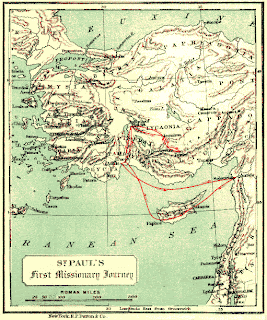But while the disciples stood around him, he got up and entered the city. The next day he went away with Barnabas to Derbe. After they had preached the gospel to that city and had made many disciples, they returned to Lystra and to Iconium and to Antioch, strengthening the souls of the disciples, encouraging them to continue in the faith, and saying, "Through many tribulations we must enter the kingdom of God." When they had appointed elders for them in every church, having prayed with fasting, they commended them to the Lord in whom they had believed. (Acts 14:20-23 NASB)Difficulty after difficulty, after difficulty, and yet Paul and Barnabas still go back through the way they came. This is interesting for a rather obscure reason. On a map, these two wound up in Derbe, which is really on the road to Antioch where they started. It would have been shorter to go to Tarsus (where Paul was actually from), and then a short trip back to Antioch. But they didn't. They took the much longer route back the way they came; back through all the trouble they had experienced.
Even if some were willing and interested in those four things, would they risk their lives for it? To my shame, I would have to say probably not. I include myself in this because I don't know if it has been my track record either. In my church, I should be so focused on these four things I should be willing to risk my life to do them. I should be willing to put myself in danger to encourage the faith of people, to strengthen the souls who attend, to support leadership, and in prayer and fasting, commend my brothers and sisters to my Master. This should be something I do, not because I'm a pastor (because I'm not), but because I follow my Master and want the things He considers to be important to be important to me.
Consider how different church would be if these four things characterized those who attend. Let's forget membership for a moment. Let's consider instead a level of commitment characterized by activity. Forget the rolls and lets examine the "roles". What if those walking through the doors had these four things at heart? There are a lot of problems in churches today, finances, internal personality conflicts, relational stress, and response to cultural pressure to conform to America instead of Scripture. So, what would these problems look like if these four priorities were common among those showing up for worship and all the other stuff that goes on throughout the week?
Well, finances wouldn't be a problem. Giving is a heart and faith issue, not an economic issue. If these four things were the priority, there would have to be faith necessary to give. Besides, leadership can't truly be supported by those unwilling to give. The heart that withholds is adversarial towards leadership, often perceived as "grasping" and dangerous (ironically, by grasping dangerous people).
Internal personality conflicts and relational stress would be almost non existent or short-lived. How can people characterized by prayer and fasting for each other be at eachother's throats? Think about what sort of conflicts would arise if those involved were motivated first by strengthening the souls and encouraging the faith of those with whom they were in conflict? They'd be over things like being of service to them, breaking down barriers of pride to permit fellowship and service, standing strong in facing a crisis in faith. I would welcome those conflicts! Bring them on! These would be conflicts where we would be fighting to face the enemy united as the body of our Master.
What about cultural pressure? A church characterized by these four motivating factors would stand and face those pressures in strength of numbers in faith. No problem. Scripture would be held high and studied vigorously for the truths revealed by the Spirit. The Spirit of the Living God would rule against the feeble abilities of human reason and philosophies. It would be a simple thing with these four things in place to perceive the difference between the perspectives of our Master and the conflicting views of our culture. We would be driven to divide the two very widely in our lives and in our church.
I suppose, in all of this, I have some work to do. First in my own life. Prayer and fasting is not something to take lightly, and it is not something done to address a light problem. As it turns out, these attitudes are actually part of a conflict I see brewing in my own church tomorrow. My church is on the brink of making an enormous mistake from which we may not be able to recover. The Master of the universe seeks obedient people to use to do His work, and I don't think He's finding enough of them in our congregation. The leadership of our church needs to address this issue in a united fashion. Man I hate missing meals. Oh well. Perhaps going into this conflict hungry will help tone down my emotions. They're running pretty high right now.

Okay, no fasting - maybe my emotion is higher than my commitment buy my wife made me breakfast, and how rude would it be not to honor her by eating it?
ReplyDelete